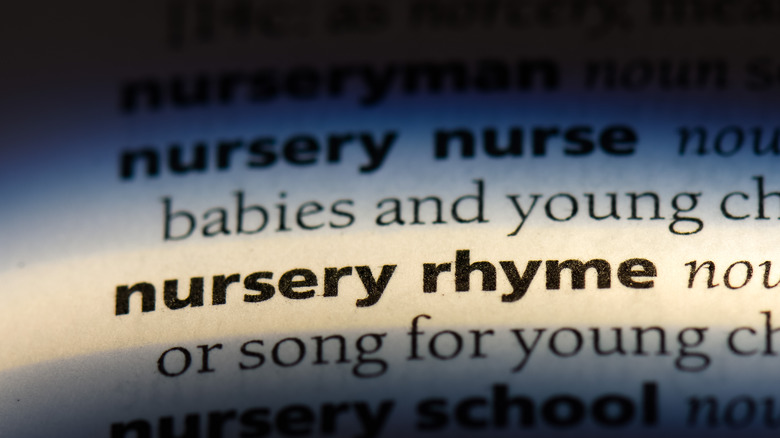The Dark Origins Of The Eeny, Meeny, Miny, Mo Nursery Rhyme
"Eeny, meeny, miny, mo" (sometimes written as "moe") has been chanted and beloved by children on playgrounds for centuries. Seemingly innocent, the rhyme is not what it seems.
In the 1800s, the nursery rhyme could be found in both the US and Europe (via An Injustice). Each country had their own lyrics, but the structure and melody remained the same. That being said, it's almost impossible to track down the true origin of "Eeny, meeny, miny, mo." What is known is that countless variations of the nursery rhyme exist. This can be due to what The Paris Review refers to as Hobson-Jobson, when words that have the same sound are translated to fit the linguistics of the native speaker's language.
Likewise, some believe the nursery rhyme is based on an ancient British counting system. Nonetheless, it's clear that "Eeny, meeny, miny, mo" was adapted through the years and revised to fit the era and place it was sung in. The classic American version most are familiar with goes like this:
"Eeny, meeny, miny, mo, catch a tiger by the toe, If he hollers, let him go, eeny, meeny, miny, mo." This, however, is a recent revision. The version before this one was much more grim and ghastly.
'Eeny, meeny, miny, mo' was rooted in racism
According to Vox, the 19th century American version of the nursery rhyme was rooted in the slave trade. Thus, instead of tiger, it said the n-word to describe what would happen if a white slave owner caught a runaway. Furthermore, another theory describes how slave traders would pinch or pull a slave's toe before purchasing them (via An Injustice). Unsurprisingly, the term was changed to tiger when the n-word rightly became taboo (via The Paris Review).
In 2004, two African-American sisters sued Southwest Airlines for discrimination on the basis of the nursery rhyme. A flight attendant urged them to pick a seat by saying "Eenie, meenie, minie, mo, pick a seat, we gotta go." The sisters claimed the flight attendant was being racist. Southwest, on the other hand, said the flight attendant had no idea of its racist implications and that the nursery rhyme was simply used in light-hearted fun. The sisters lost and when they appealed, the Tenth Circuit Court of Appeals affirmed the ruling.
It's safe to say that as classic as "Eeny, meeny, miny, mo" is, the centuries-old nursery rhyme no doubt has a haunted past and not so kid-friendly origins.

